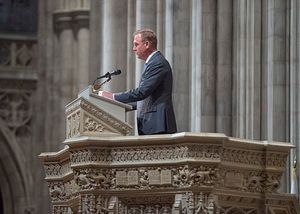It goes without saying that the biggest foreign policy challenge Patrick Shanahan faces in his new job as acting secretary of defense of the United States is the relationship with China. His 30-plus year career at Boeing may have been just the training job for exactly that role.
There are few American companies with a longer history in modern China; fewer still have had the impact on both sides of the Pacific that Boeing has had.
Boeing just delivered its 2,000th plane to China. More than half of Chinese commercial planes are supplied by Boeing. And according to the company, every Boeing plane in the world has at least some components which are made in China.
There has been much speculation since U.S. President Donald Trump chose Shanahan as an interim replacement for the legendary Jim Mattis that the former Boeing executive might not have the wherewithal or political savvy to deal with the prickly Chinese relationship.
There is little so far upon which to base these concerns, and much to allay them altogether.
First, Shanahan’s Boeing career suggests a steady, highly intelligent hand. Shanahan has double Master’s degrees from MIT, in both mechanical engineering as well as in business.
With those degrees, he achieved several posts as senior vice president in various roles at Boeing, but, tellingly, he did not get the top job.
That may be a point in his favor. His selection to head up key positions in the company, often highly risky ones such as the Dreamliner rescue and turnaround, suggests that Shanahan rose in the Boeing ranks through capability and competence, rather than by playing corporate politics.
In addition, Shanahan has deep experience with both the military as well as the commercial side of Boeing’s business. That puts him in good stead to understand from both a business as well as a technical perspective the capabilities of the Chinese military, and how they should be met to maintain an American advantage.
Third, as reported by the New York Times last year, after the Dreamliner was saved, Shanahan “was later put in charge of all commercial airplane programs, where he was credited with smoothly ramping up production. He was elevated last year to Boeing’s top leadership council, overseeing suppliers and production facilities for the whole company.”
By definition, this means that Shanahan has already dealt with the Chinese on key issues. “Smoothly ramping up production,” some of it from within China, speaks directly to overcoming manufacturing issues, negotiating with key stakeholders, and resolving not only technical and business issues, but also cultural issues, in order to produce the desired results. That speaks to experience that can act as a platform for the strategic issues that face the U.S.-China military relationship.
A clue to Shanahan’s ideological approach to that relationship, and to his new job, can be found in his reading choices. In an interview with CNBC in late 2018, Shanahan disclosed that one of his favorite books is Freedom’s Forge, by Arthur Herman.
According to the book’s publisher, Herman “reveals how two extraordinary American businessmen — General Motors automobile magnate William “Big Bill” Knudsen and shipbuilder Henry J. Kaiser — helped corral, cajole, and inspire business leaders across the country to mobilize the “arsenal of democracy” that propelled the Allies to victory in World War II.”
“In four short years,” the summary continues, “they transformed America’s army from a hollow shell into a truly global force, laying the foundations for the country’s rise as an economic as well as military superpower.”
Between the inspiration that Shanahan says he drew from his Vietnam War veteran father, and his appreciation of the story of the conversion of American industry from commercial to military production, it is clear that the underpinnings of Shanahan’s career choices are rooted in a deep-seated American patriotism.
But Shanahan has a coldly practical side as well. “The Pentagon should focus on outcomes and outputs — our performance,” he has said. “This focus on performance should drive us to field unmatched lethality, execute on our modernization plans and achieve this affordably.”
Shanahan’s combination of intellect, multifaceted experience, ideological grounding, and focused practicality earned him a confirmation vote of 92-7 for deputy secretary of defense by the U.S. Senate in 2017, a rare show of bipartisanship in Washington over the last two years.
But perhaps the clearest clue to his appointment to the acting secretary post by the president is his seeming agreement with both Trump and Vice President Mike Pence on the nature and degree of the most pressing threats to America’s military dominance. In his CNBC interview, Shanahan said that Russia and China are two different threats.
“It’s a competition but they’re different competitors,” he said. “And to win and dominate is going to take a different set of capabilities with each.”
With a withdrawal of troops from Syria to handle, proof of China’s increasing capability in space with a landing on the moon’s dark side, and Russian claims of a new hypersonic missile system invulnerable to U.S. defenses, Shanahan has plenty on his plate as he gets started in his new job this week.
If he finds himself looking for a bit of irony to lighten the load, he need look no further than his old employer’s past.
As Seattle Business Magazine reported in 2016, “China-born Wong Tsu was the first aeronautical engineer Bill Boeing hired at his fledgling airplane company. Wong, a graduate of MIT, designed the Model C bi-wing trainer, Boeing’s first commercial success. Wong returned to China in 1917 and helped establish that country’s aviation industry, ultimately designing more than two dozen aircraft.”
As of this week, another MIT graduate has the job of handling what that country’s aerospace and military capabilities have become, since fellow alumni Wong Tsu began building those capabilities for China just over 100 years ago.
































